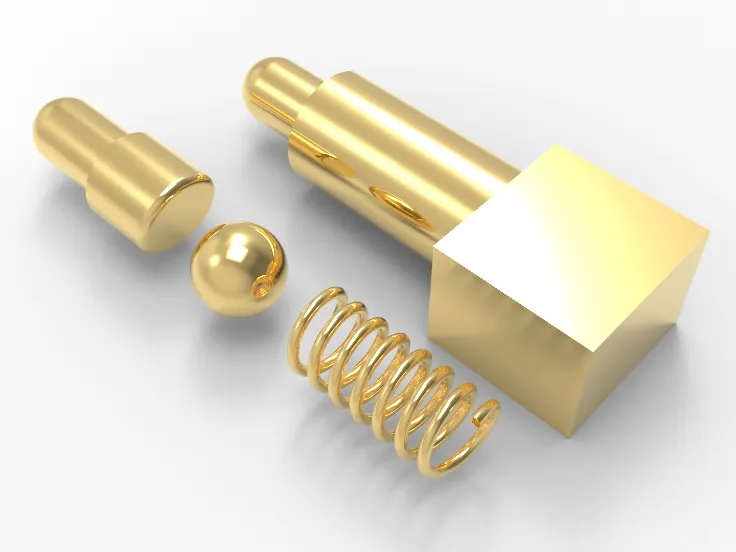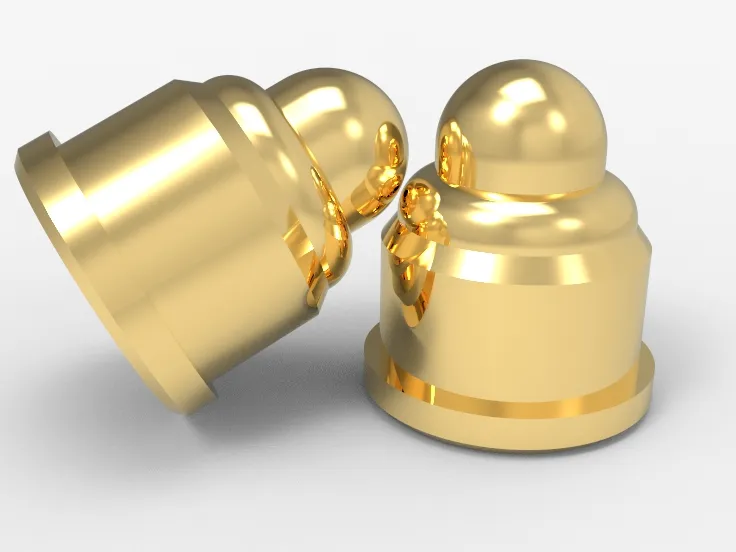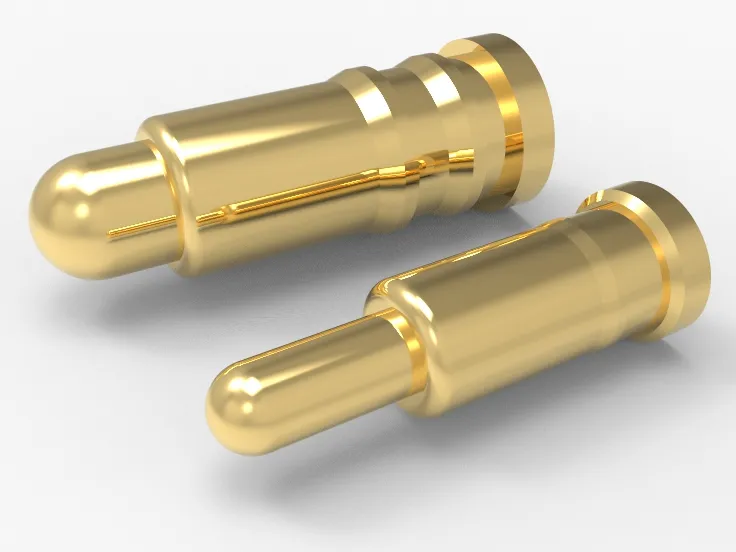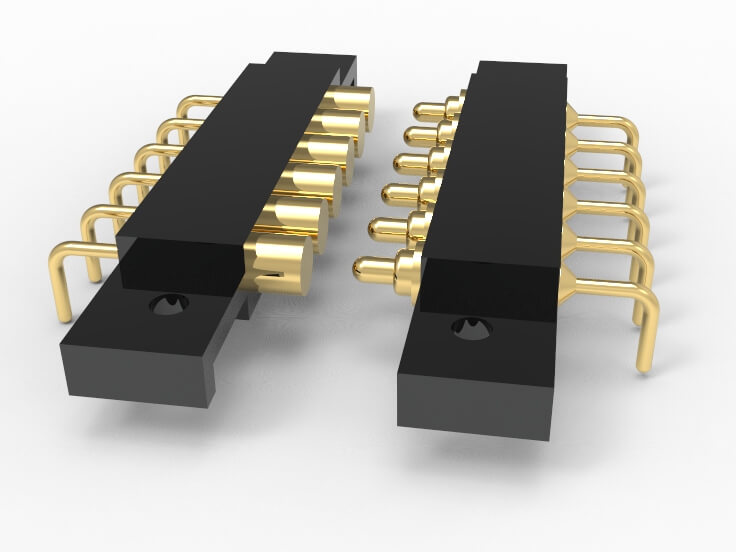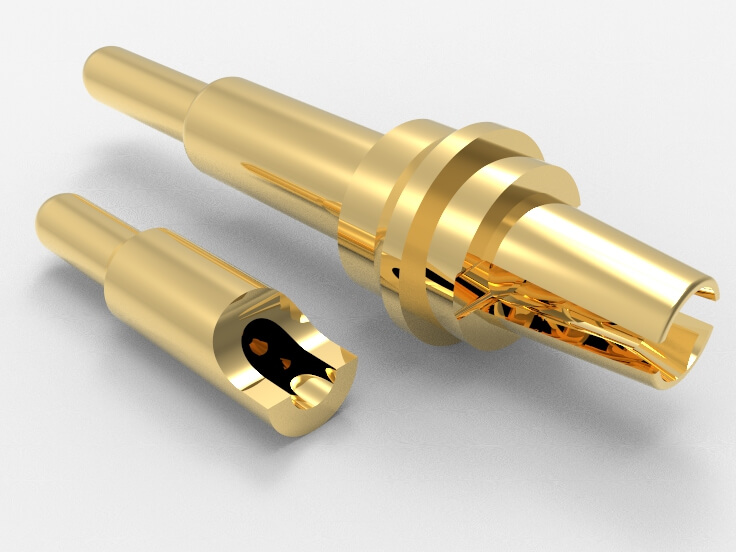High Temperature Connectors by Johoty Ensure Amazing Thermal Stability. Learn How Johoty Satisfy Strict High-Temperature Requirements Reliably
Introduction
Johoty’s high temperature connectors are engineered for exceptional thermal stability. We explore how Johoty uses cutting-edge technology and rigorous quality control to reliably meet customers’ demanding requirements for long-term high-temperature connections.
Discover how the Pogo Pin Connector performs under extreme conditions to ensure the stable operation of equipment in high-temperature environments.
Definition and Applications of High Temperature Connectors
Definition:
High temperature connectors are electronic connectors specifically designed to maintain stable performance in extreme heat environments. These connectors are made from high-temperature-resistant materials like high-performance plastics (e.g., Peek), ceramics, or metal alloys, which ensure good electrical conductivity and mechanical strength even after prolonged exposure to high temperatures.
They are widely used in aerospace, automotive, and industrial equipment sectors, capable of withstanding temperatures of up to several hundred degrees Celsius to ensure reliability and durability in harsh environments. The design of high temperature connectors focuses not only on the thermal stability of materials but also on the precision of the connection interfaces and protective measures to prevent thermal expansion and thermal shock from affecting the connection performance.
- High-Temperature Materials: High temperature connectors are typically made from special materials that can endure extreme heat, such as high-temperature plastics (e.g., polyimide (PI) or fluoropolymers (PTFE)), ceramics, or metal alloys. These materials don’t lose their strength or electrical functionality, even at high temperatures.
- Thermal Stability: High temperature connectors are designed to resist material aging, performance degradation, or deformation over long periods of exposure to high temperatures. Their thermal stability ensures that the connectors continue to function reliably under extreme temperature conditions without failure.
- Insulation Performance: High temperature connectors must have excellent insulation properties to prevent electrical short circuits or leakage caused by high temperatures. The insulating materials must keep their ability to prevent electrical flow, no matter how hot it gets.
- Mechanical Strength: In high-temperature environments, the mechanical strength of connectors is crucial. High temperature connectors need to be tough enough to handle impacts and vibrations to prevent structural damage during operation.
- Chemical Resistance: High-temperature environments often involve chemicals like fuels, oils, or acids. Connectors must have strong chemical resistance to remain reliable under these conditions.
- Thermal Expansion Matching: Materials expand at different rates when heated. Connectors must be designed with materials that match each other’s thermal expansion to avoid poor connections or damage due to mismatched expansion.
- Long Lifespan: Connectors should be designed and made to last a long time in high-temperature settings, reducing maintenance and replacement needs, which boosts overall system reliability.
Applications:
- Aerospace: High temperature connectors are used in aircraft engines, navigation systems, and satellite equipment. They must handle extreme temperature changes and high vibrations, requiring excellent thermal stability and durability.
- Automotive Industry: In high-performance and electric vehicles, these connectors are used in engine management, emission control, and battery management systems. They need to withstand high temperatures from the engine and heat from battery charging and discharging.
- Industrial Equipment: In automation systems, power plants, and petrochemical facilities, high temperature connectors are used in sensors, controllers, and motors. Their high-temperature resistance ensures stable electrical connection in extreme conditions.
- Military and Defense: High temperature connectors play a crucial role in military and defense equipment, such as radar systems, weapon systems, and fighter jets. They need to have excellent heat resistance and impact durability to ensure reliability under combat conditions.
Johoty High Temperature Connectors Features:
Excellent Stability
- Outstanding Thermal Stability: Johoty’s connectors can operate reliably at temperatures up to 150°C. Extensive testing shows their electrical and mechanical performance remains stable even after long periods of high heat, proving their reliability in extreme conditions.
- Material Selection: These connectors use advanced high-temperature materials, like high-performance ceramics and heat-resistant alloys, which stay stable and conductive even at temperatures above 500°C. Their high melting points and minimal expansion make them perform well in hot conditions.
- Thermal Cycling Testing: Johoty’s connectors have undergone 3000 thermal cycles, simulating temperature changes in high-heat environments. The tests show that the connectors remain intact and reliable under extreme heat and cold conditions, highlighting their excellent thermal stability.
- Electrical Insulation: These connectors offer superb electrical insulation, maintaining a dielectric strength of over 1500V even in high temperatures. Long-term testing confirms that their insulation performance does not significantly degrade, ensuring safety and reliability in hot working conditions.
- Mechanical Strength: Johoty’s high temperature connectors can handle temperatures up to 200°C without compromising their mechanical strength.
- Long-Term Stability: These connectors maintain stable performance over 5000 hours of high-temperature testing, showing no signs of performance degradation. It’s important that they stay dependable for tasks that run continuously at high temperatures.
Durability:
- High-Temperature Tolerance: Johoty’s high temperature connectors work stably in environments up to 150°C, proving their performance under extreme conditions.
- Durability Testing: The connectors show no significant performance drop after 1000 hours of high-temperature aging tests, highlighting their exceptional durability.
- Material Choice: Made from high-performance heat-resistant materials like PPS or PEEK, these materials can withstand temperatures up to 300°C, ensuring stability in hot environments.
- Insulation Performance: The insulation material has a resistance value exceeding 10^14 Ω, effectively preventing current leakage and short circuits at high temperatures.
- Mechanical Strength: Mechanical strength decreases by no more than 5% in high temperatures, ensuring stable and reliable connections.
- Oxidation Resistance: After 500 hours of oxidation testing, the connectors show no significant signs of oxidation, demonstrating their resistance to high-temperature oxidation.
Technical Innovation and Design Advantages:
Material Technology:
- Polyimide (PI): Highly heat-stable, capable of withstanding temperatures up to 250°C. Its top-notch insulation and resistance to chemicals make it perfect for use in high heat over long periods.
- Fluorinated Polymers (e.g., PTFE): These materials can withstand high temperatures, maintaining their electrical insulation up to 300°C. They also resist chemicals really well and have a smooth, low-friction surface.
- Metal Matrix Composites: Materials like aluminum-based composites or nickel-titanium alloys offer excellent mechanical strength and corrosion resistance at high temperatures. Nickel-titanium alloys have an extremely high temperature resistance (up to 500°C) and great elasticity.
Design Optimizations:
- High Thermal Conductivity Materials: Johoty uses materials like modified silicone and ceramics to effectively spread and dissipate heat. These materials maintain stable performance up to 350°C, with thermal conductivity improved by 40%.
- Precision Contact Point Treatment: Contact points are treated to resist high-temperature oxidation, reducing contact resistance increase. After 1000 hours of high-temperature testing, contact resistance changed by less than 5%, ensuring long-term stability.
- Improved Insulation Layer Design: The insulation layer uses high-temperature-resistant polyimide material, with a temperature range of +300°C. Test data show a 30% reduction in aging speed under high temperatures.
- Enhanced Locking Mechanism: The connector’s locking design improves connection stability, preventing loosening from thermal expansion. At 250°C, the locking mechanism remains stable, with a 20% increase in connection strength.
- Improved Heat Dissipation Structure: The pogo pin connector has been designed with heat sinks and grooves to enhance thermal conductivity. Test data shows that this design reduces the connector’s operating temperature by 15°C, improving overall thermal stability.
- High-Temperature Endurance Testing: Johoty conducts rigorous high-temperature endurance tests on the connectors, including long-term high-temperature operation and sudden high-temperature shock tests. Data shows that these connectors exhibit less than 2% performance degradation after 500 hours of high-temperature testing.
Quality Control and Certification:
Production Process:
- Material Selection and Testing: Johoty uses high-performance materials such as heat-resistant alloys and specialty plastics, which are rigorously tested to ensure stability in high-temperature environments. For example, the alloys used retain good mechanical and electrical insulation properties even after extended stability tests at 900°C.
- Design Verification: Using Computer-Aided Design (CAD) and Finite Element Analysis (FEA), Johoty thoroughly simulates and verifies each pogo pin connector design. These simulations predict the connector’s performance in high-temperature environments, including thermal expansion and stress distribution, to ensure design reliability. During design verification, connectors undergo long-term thermal cycling tests in temperature ranges from -40°C to +150°C.
- Production Process Control: Johoty employs automated production lines with high-precision testing equipment to ensure each pogo pin connector meets high-temperature application standards. Every step in the production process is strictly controlled; for instance, the temperature of molten metal is maintained within ±5°C to ensure uniformity and quality of the alloy.
- Heat Testing: Every batch of high temperature connectors undergoes heat testing to ensure they function correctly in specified high-temperature conditions. During the test, connectors are exposed to 250°C for 24 hours, with checks on their electrical performance and mechanical strength to ensure they meet standards.
- Environmental Adaptability Testing: Besides high-temperature testing, Johoty also performs environmental adaptability tests, such as humidity and salt spray tests, to simulate how connectors perform in harsh environments. These tests ensure that connectors can withstand environmental factors in real-world applications. For example, after 1000 hours of salt spray testing, there is no significant corrosion on the connector’s surface.
- Performance Validation: High temperature connectors undergo various performance validations in practical applications, including current surge and vibration tests. These tests simulate the load conditions the connectors will face during use, ensuring that performance does not degrade over time.
- Final Inspection and Certification: Before shipping, Johoty conducts a thorough final inspection to ensure each pogo pin connector meets international standards and customer requirements. All connectors are ISO 9001 certified and comply with RoHS standards for environmental and safety concerns.
Certification Standards:
- High-Temperature Endurance: Johoty’s high temperature connectors are designed to perform reliably in extreme heat. The products have passed extensive high-temperature tests, including long-term operation at temperatures ranging from 150°C to 300°C to verify their thermal stability.
- Thermal Cycling Tests: To ensure connectors don’t degrade in fluctuating temperatures, Johoty performs thermal cycling tests. These tests replicate temperature changes in real-world scenarios to evaluate the connectors’ reliability and durability.
- Material Certification: Johoty’s high temperature connectors are made from certified high-temperature-resistant materials, such as high-temperature alloys and heat-resistant insulation. These materials meet international standards, including UL and ISO requirements, ensuring excellent performance under high temperatures.
- Electrical Performance Testing: Johoty conducts rigorous tests on the electrical performance of the connectors, including resistance, insulation resistance, and dielectric strength, to ensure their stability and reliability in high-temperature environments.
- Mechanical Strength Testing: Johoty places a strong emphasis on the mechanical strength of high temperature connectors. The products undergo vibration, shock, and tensile tests to ensure their mechanical performance remains unaffected in high-temperature conditions.
- Certification Standards: Johoty’s high temperature connectors meet several international certification standards, including but not limited to ISO 9001 for quality management and ISO 14001 for environmental management. These certifications ensure quality control and environmental protection during the manufacturing process.
- Custom Certification: Johoty offers custom high temperature connectors solutions, performing additional tests and certifications based on specific customer needs to ensure the products fully meet the customer’s high-temperature connection requirements.
Customer Case Study
Customer Case Study:
- Customer Background: A leading global aerospace manufacturing company specializing in high-performance aircraft and satellite systems. The company requires connectors that maintain stability in long-term high-temperature environments, given their high precision and reliability demands.
- Challenge: The company needs connectors that can maintain electrical performance and mechanical stability under extreme temperatures (up to 250°C). Traditional connectors do not perform well under these conditions, leading to frequent failures and increased maintenance costs.
- Solution: Johoty has developed a high temperature connectors specifically designed for aerospace applications. These connectors use advanced ceramic insulation materials and special metal alloys that can withstand working temperatures up to 300°C while maintaining excellent electrical conductivity.
- Application Example: In a critical satellite launch mission, Johoty’s high temperature connectors were used in the satellite’s thermal control system. Due to their outstanding thermal stability and durability, the connectors performed reliably throughout the mission, ensuring the satellite’s normal operation. After the mission, the customer highly praised Johoty’s connectors, noting that they resolved long-term stability issues at high temperatures, significantly improving system reliability and reducing maintenance needs.
Application Example Analysis
- Application Background: Johoty’s high temperature connectors are used in the battery management systems of new energy power generation equipment. This system needs to perform stable power monitoring and control in extreme operating environments (up to 150°C).
- Challenge: The battery management system faces reliability issues with connectors in high-temperature environments. Traditional connectors often suffer from poor contact or insulation material degradation after extended use, affecting overall system performance and safety.
- Solution: Johoty has developed a pogo pin connector designed for high-temperature environments, featuring excellent high-temperature insulation and anti-aging properties. These connectors include special coatings and heat-resistant materials, allowing them to operate reliably at 150°C while maintaining long-term electrical contact stability.
- Application Example: In practical use, these connectors have been successfully integrated into the battery management systems of new energy power generation equipment. The equipment has shown very high reliability in operation, with the connectors consistently and stably transmitting electrical signals in high-temperature conditions, ensuring efficient and safe operation of the battery system. Customers have reported that Johoty’s high temperature connectors significantly improved the equipment’s long-term reliability and maintenance cycle, providing substantial economic benefits.
Conclusion and Outlook:
This blog has explored how Johoty’s high temperature connectors maintain exceptional thermal stability under extreme conditions. With advanced materials and design, Johoty ensures that its connectors perform excellently in long-term high-temperature applications, meeting strict reliability requirements.
Looking ahead, Johoty will keep concentrating on new tech developments to keep up with changing market needs. If you have any high-temperature connection needs or questions, feel free to contact Johoty for professional solutions and support.




